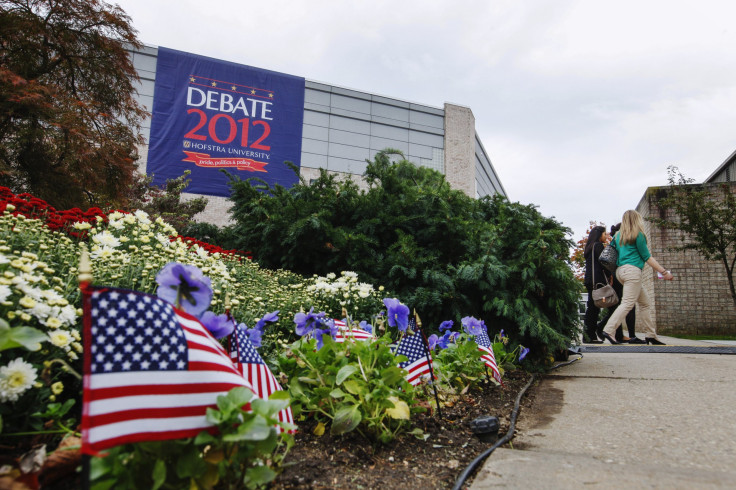Presidential Town Hall Debate 2012: 5 Things To Watch For

Round two is almost upon us. Republican Party presidential nominee Mitt Romney will try to build on the momentum generated by his unexpectedly commanding performance in the first debate, and President Barack Obama will try to rebound from a lackluster showing in which he often appeared disengaged. Here are some key things to look for:
1. Moderation in moderation? Jim Lehrer was widely faulted for a meek performance in the first debate; Martha Raddatz has won plaudits for her focused, persistent questions in the vice presidential iteration. Ahead of the second presidential debate, Romney and Obama have found a rare moment of unity in agreeing they prefer the Lehrer model.
This is to be a "town hall" style debate, meaning it will be guided by pre-selected questions from the audience. The two campaigns evidently have agreed to a format that neutralizes moderator Candy Crowley, stipulating, among other things, that she "will not rephrase the question or open a new topic," will refrain from follow-up questions and will basically do nothing "except to acknowledge the questioners from the audience or enforce the time limits."
Crowley, of CNN, has since suggested that she would like to play a larger role in pressing the candidates about their responses. It is unclear how much of a role she will play.
2. Immigration: After vowing during his 2008 run to pursue comprehensive immigration reform, Obama instead launched an unprecedented crackdown on undocumented immigrants. He has presided over more deportations than any other president, angering Latino allies who represent a constituency that is key to his re-election. Obama allayed some of that anger by announcing earlier this summer that he would allow hundreds of thousands of young undocumented immigrants to apply for reprieves from deportation and work permits.
The announcement helped expose Romney's weaknesses on the issue. The former Massachusetts governor adopted a hard-line immigration stance during the Republican Party primaries that pleased conservative voters but alienated Hispanics, calling for a policy prioritizing "self-deportation" and lauding Arizona's controversial new law. Given the pivotal role Latino voters could play in this election, an immigration question is a strong possibility.
3. Obamacare: During the summer of 2010, the backlash against the Affordable Care Act came to be embodied by town hall meetings where irate Americans hurled questions at their representatives. That also offered a parallel to 1994, when then-President Bill Clinton stumbled through a defense of his own health care initiative in response to a question from a certain pizza magnate and future presidential aspirant.
The questions in Tuesday night's debate will be screened ahead of time to prevent anything overly incendiary, so don't expect a miniature tea party rally. But the format could force Obama to defend, in a more intimate setting than he is accustomed to, a law that many Americans still view with deep skepticism; it could also compel Romney to explain how he supported universal health care in Massachusetts but promises to revoke it at the federal level, and to detail how his current plan represents a better alternative.
Further, look for questions about Medicare in particular. Romney charges that Obama is siphoning money from the entitlement program and restricting seniors' choices about coverage; Obama says Romney's plan puts the elderly at the mercy of insurance companies. Someone with a stake in the matter is likely to get a question.
4. Libya: For months, Romney has tried, with little success, to attack Obama's foreign policy record. But the administration's handling of the deadly Sept. 11 assault on Americans in Benghazi has offered an opening that Romney is eager to exploit. He has hammered the issue on the campaign trail and said in a recent speech that the Middle East has become more dangerous under Obama.
Obama will likely respond by pointing to his successes abroad, from ordering the raid that killed Osama bin Laden to initiating the withdrawal of American troops from Iraq and Afghanistan. But with four Americans slain in Libya and the situation in Syria continuing to deteriorate, Obama is as vulnerable on foreign policy as at any point during his presidency.
5. Culture wars: The first debate was striking for the utter absence of wedge issues like abortion or same-sex marriage. In an election cycle dominated by concerns about the economy, the focus was on tax policy, health care and jobs. It was the same story in the vice presidential debate, save a question at the end about how Catholicism has shaped Paul Ryan and Joe Biden's views on abortion.
But that's not to say that battles over reproductive health and gay rights haven't emerged in the campaign. Republicans helped foment a resistance to a provision in the Affordable Care Act requiring insurance companies to cover contraceptives; in response to accusations of trampling religious liberty, Democrats said Republicans were waging a "war on women." And in May, Obama became the first American president to openly support same-sex marriage.
Both of these issues are critically important to some voters, so the free-flowing format of the town hall-style debate makes a question on either topic more likely.
© Copyright IBTimes 2024. All rights reserved.











